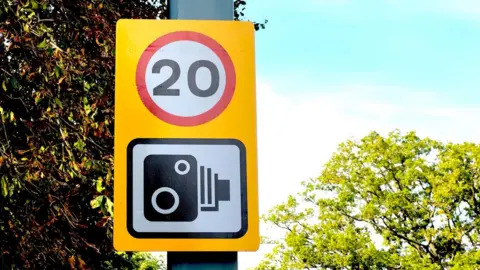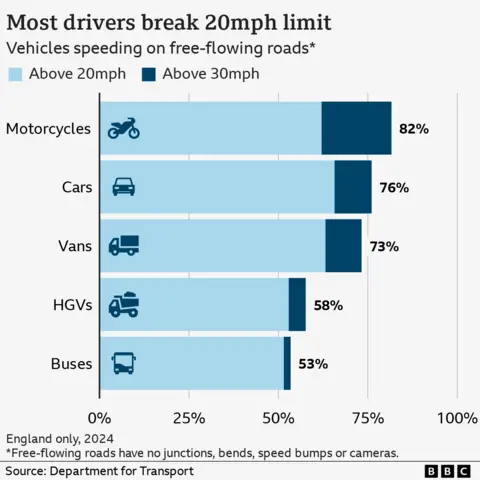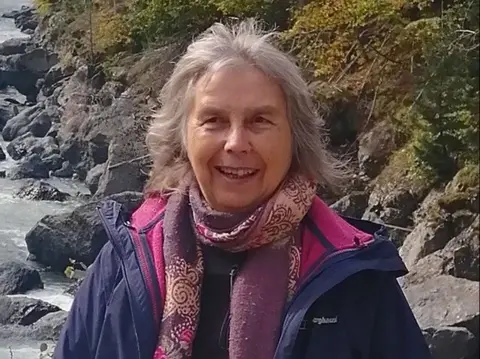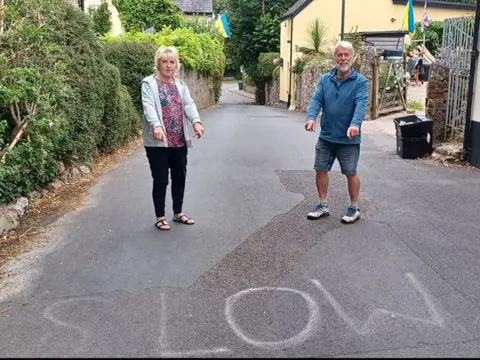Drivers prone to speeding on 20mph roads, figures suggest
 Getty Images
Getty ImagesThey were rolled out across Britain to cut speeds and prevent traffic accidents in built-up areas. But new figures suggest that the vast majority of drivers are speeding along many stretches of roads with 20mph limits.
According to the Department for Transport, three-quarters of drivers exceed the limit on "free-flowing" sections of 20mph roads in England - those with no cameras, sharp bends, junctions or traffic calming measures.
Half of drivers who admitted to speeding and were spoken to by the RAC said they sped on such roads because they felt the limit was "inappropriate" - a view also reflected by those spoken to by the BBC.
The DfT figures also show that a record number of people – 1.84 million – attended speed awareness courses in the UK last year.
The data was collected in 2024 from automated traffic counters on "free-flowing" 20mph roads in England. The average speed recorded was 24mph - but about 10% of vehicles exceeded 30mph.

England was given its first 20mph speed zones in 1991 in Sheffield, Kingston upon Thames and Norwich. Hundreds of zones have since been created, and hundreds of miles of roads included in the limit - in London, for instance, more than 150 miles of road has been converted to 20mph since 2018.
Rod Dennis, road safety spokesperson for the RAC, said that speeding was a leading factor in fatal road collisions and despite many drivers exceeding the limit, 20mph zones still cut average speeds.
Research submitted to parliament in 2023 suggests that these speed limits can reduce fatalities particularly when used with traffic calming measures.
This rollout in towns and cities across Britain could also be a factor in the rising number of speed awareness courses, said Mr Dennis.
Drivers however have complained that the zones are often plagued by inconsistent signage and information.
Anne Page, 71, attended a "very good" speed awareness course after being caught doing 27mph on a 20mph section of road in London earlier this year.
She favours limits in areas where traffic, bikes and pedestrians mix, but says that signage is "patchy, gradual and inconsistent" and stressed the need for a more "high-profile campaign" to alert drivers when limits change.
 Anne Page
Anne PageAJ, 62, from West Drayton, London, said it was "exceptionally hard to sustain 20mph over a long distance".
He was clocked doing 24mph on a 20mph stretch of an A road in London.
Safety campaigners say 20mph limits should be rolled out across all UK urban areas while other groups campaign to limit them and improve driver behaviour.
Blanket restrictions may dilute the impact of speed limits, says Luke Bosdet of the AA.
He added that it may be more effective to target their use near schools, hospitals, and pedestrian areas "where drivers can see the reasons for them being there" rather than relying on signs alone.
In Torquay, Marilyn and Norman Roberts have spray-painted the word "slow" on the road to deter speeding drivers.

"Cars go speeding up and down the road with no regard for the speed limit," Mr Roberts said.
"If we wave our hands at cars and ask them to drive slower, we get all sorts of abuse."
A spokesperson for the Department for Transport said that there is "no excuse for those who risk the lives of others through speeding", and that "tough penalties" already exist for those who do.
Additional reporting Robert Cuffe, David Verry, Rob England and Kris Bramwell.

